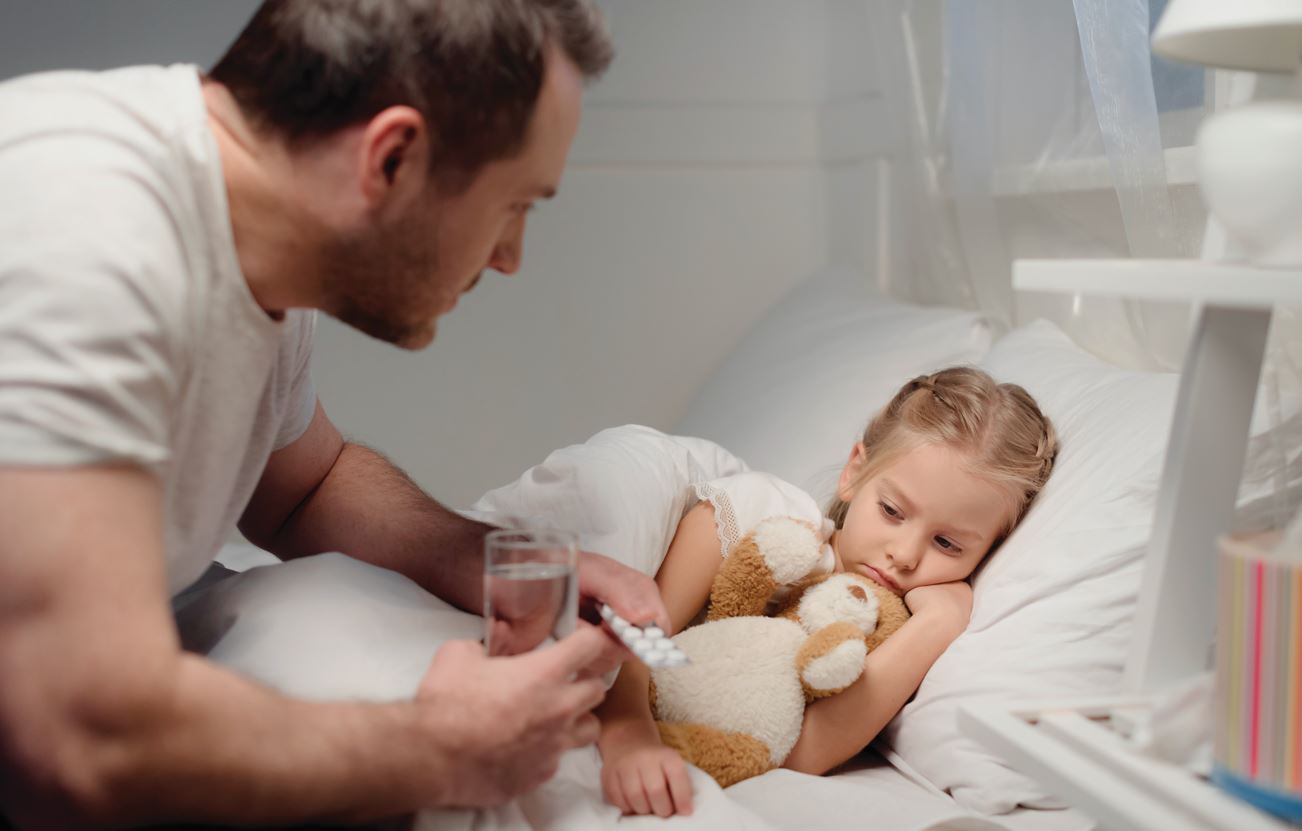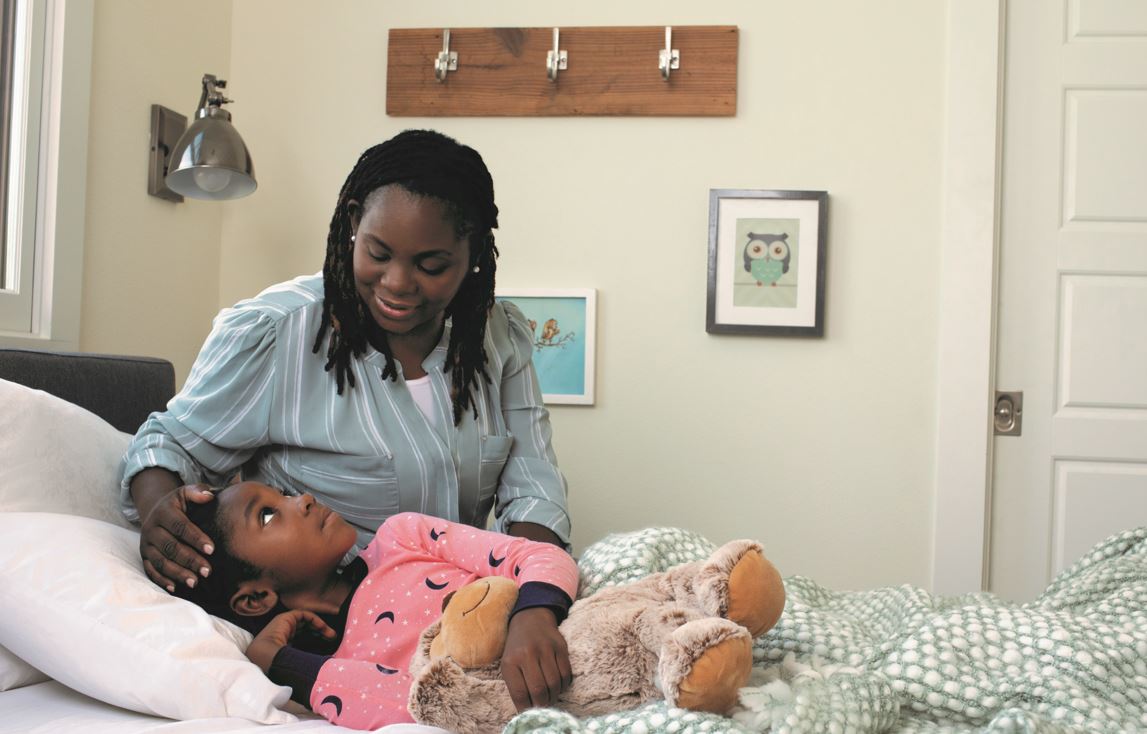Usually a good student, your child has started struggling in school.
Bedwetting has become a frequent occurrence- long after your child has been potty-trained.
Your child has had several bouts of strep throat in the past year.
When children experience a new onset or ongoing issues like these, parents look for answers.

Typically, they may suspect causes such as defiance, attention seeking, lack of effort, or underlying learning differences and challenges.
But here’s one possibility parents and even many pediatricians often overlook: sleep problems. Any of the problems listed above could be caused by problems with your child’s sleep.
Unfortunately, sleep problems in children aren’t always easy to spot. Adults usually know when they’re not sleeping well; children aren’t always aware. While most adults feel drowsy or fatigued when they’re sleep deprived, children may instead exhibit hyperactivity or other unfavorable behavioral issues.

When a child isn’t sleeping well, it exacerbates everything, from moodiness and irritability to trouble concentrating in school. Even other clinical history such as frequent ear infections or repeated instances of strep throat may be related to a crowded airway, resulting in sleep disordered breathing.
Keep in mind, too, that your child may be getting plenty of hours of sleep, yet not getting the necessary quality, restorative sleep they need to thrive and perform to their best abilities. Often this is not obvious to parents.
Your best defense: know the signs of sleep problems. Keep an eye on your child’s sleep patterns and discuss any signs of trouble with your child’s pediatrician or with a pediatric sleep expert.
Disrupted Sleep. In some cases, a child’s sleep problems are obvious. The child can’t go to sleep in the evening, or wakes often during the night, has trouble waking in the morning or staying awake during the day. All of these issues should be investigated. (Keep in mind that not all sleep problems are medical problems; some may be addressed with sleep training and better sleep hygiene. More on that later.)
Sometimes, parents discover sleep problems by accident. Pediatric sleep clinics tend to see an uptick in new patients after spring break or at the end of summer. While on vacation, family members sleep together in a hotel room. Often, that’s the first time that parents notice that their child snores or sleeps restlessly. (If you’re concerned that your child may have a sleep problem, it may be a good idea to try sleeping in the same room or checking in periodically on the child after he or she has gone to sleep.) 
Up to 50% of children will have some type of sleep issue. When a child doesn’t get enough sleep, that can lead to other health issues and behavioral problems.
Here are some signs of sleep problems to keep an eye on:
Restless sleeping. The old adage “sleeping like a baby” still applies to young children. Babies or children who move around often at night – five times or more per hour -- could have disordered sleep. If you put the baby to sleep with her head at one end of the bed, and then find her a few hours later completely turned around in the opposite direction, that’s also something to discuss with your child’s physician.
Restless legs. Legs that that twitch or jerk during the night could be signs of restless legs syndrome (RLS) or periodic limb movement disorder (PLMD). Ditto if your child reports that his legs hurt or feel edgy at bedtime. Keep in mind, too, that RLS or PLMD are often mistakenly diagnosed as “growing pains” and treated with pain medication. However, many children with RLS have an iron deficiency that can be detected with a blood test; in that case, iron supplements can treat the problem, not just the symptoms.
Abrupt arousals or pauses in breathing. If you notice your child stops breathing for periods of time while asleep, or jerks awake frequently during the night, that’s a symptom that could signal sleep problems.
Snoring. Snoring is not normal for a child. Snorting, rasping or gasping sounds while sleeping can be a sign that something is amiss.
Disordered sleep breathing. Any sign that the child isn’t breathing easily at night, including snoring or pauses in breathing, could be a symptom of sleep apnea. In this condition, the patient temporarily stops breathing for 10 seconds or more while asleep, preventing the kind of deep, restorative sleep that’s so important for children as well as adults. Some 5 percent of kids have sleep apnea; causes include obesity, enlarged tonsils or other upper airway anatomical abnormalities. A child with sleep apnea may sleep enough hours for his or her age, but still be tired or cranky. That’s because the child isn’t getting good quality sleep.
Parasomnias. Another big concern for many parents are behaviors called “parasomnias”—nightmares, night terrors, sleep eating or sleep walking. These can be distressing but not necessarily signs of sleep problems. If they occur only once every few months, it’s likely not a problem. If it’s more often, parasomnias can be a sign of sleep deprivation which requires intervention.
New onset bedwetting. If your child has been potty-trained and stayed dry at night for a long period of time – then starts wetting the bed again – that can be a sign of a sleep problem. When children aren’t getting enough sleep, that prevents the release of hormones, causing the body to produce more urine. As a result, the child wets the bed. Any instance of new onset bedwetting should be investigated.
Multiple nighttime bathroom breaks. If your child starts getting up frequently at night to use the bathroom, that could signal sleep problems or even diabetes. 
Frequent infections. Children with disordered sleep breathing may snore or sleep with their heads tilted back, an unconscious attempt to better open up the airway while asleep. That prevents mucus from draining normally in the ears and throat, and that can lead to frequent ear infections or instances of strep throat. Antibiotics may treat the infection, but it occurs over and over again. With treatment -- surgery to remove the tonsils and adenoids, and/or an oral appliance or sleeping mask to address sleep apnea -- the infections usually clear up immediately.
Behavioral issues may arise when a child has a sleep problem. These can include irritability, learning difficulties, poor academic performance, even vehicle crashes. Children often don’t manifest sleep deprivation in the same way that adults do. Instead of fatigue or drowsiness, the child may exhibit hyperactivity. Many times, behavioral problems in children caused by lack of good quality sleep mirror those of attention deficit disorder (ADD) or attention deficit hyperactivity disorder (ADHD).
Many pediatricians and other practitioners may not consider the possibility of sleep problems. It’s not uncommon for a child to be diagnosed with ADD or ADHD when in reality the problem stems from poor sleep. It’s especially important to investigate the possibility of sleep problems when a child or teen begins exhibiting new behavioral issues that weren’t previously occurring.
The Next Step
If your child displays any of these symptoms, discuss them with your pediatrician.
The American Academy of Pediatrics recommends a sleep evaluation for children who exhibit one or more of these symptoms.
In a sleep evaluation, you’ll meet with a board-certified sleep specialist to discuss your concerns about your child’s sleep. The specialist may recommend a polysomnography, or sleep study, a comprehensive test for diagnosing sleep disorders. For this test, the child will spend the night (along with a parent or guardian) in a comfortable room in a sleep lab. A technician will attach sensors that will record the child’s brain waves, blood oxygen levels, heart rate and breathing, eye and leg movements and more. The sleep study monitors your child’s sleep stages and cycles to help pinpoint if or when sleep patterns are disrupted and why.
Based on the results of the sleep evaluation, a sleep medicine physicians will make a diagnosis and identify the best treatment plan for your child’s condition. That might include referral to a surgeon to consider a tonsillectomy and removal of adenoids; medication for restless legs syndrome: or a CPAP or oral appliance that helps a child with sleep apnea to breathe better during the night.
Good sleep hygiene
Finally, remember that not all sleep issues are caused by medical conditions. With babies and toddlers, parents often establish habits that unknowingly encourage the baby to awake in the middle of the night for feeding or even socializing. A sleep specialist can advise parents on the best way to adjust night-time and sleep habits for improved sleep.
Also, many issues can be prevented or addressed by making sure your child is practicing good “sleep hygiene.” Sleep hygiene is a set of habits that will help your child sleep well. That means following a regular sleep schedule – going to bed and waking at the same times each day. Also, at least three hours before bedtime, the child should avoid bright lights, computer or TV screens, heavy meals and vigorous exercise.
Try to keep the bed as a place for sleep and nothing but sleep. Don’t encourage children to read in bed. The bed should not be associated with any activities other than sleep.
The bottom line
If you recognize any of the symptoms listed above, or suspect your child may have a sleep problem, talk with your pediatrician. Ask if an evaluation with a sleep specialist might be in order or give us a call.
With the right diagnosis and treatment plan, you may be pleasantly surprised by how much happier and healthier your child will be with the benefit of a good night’s sleep.

